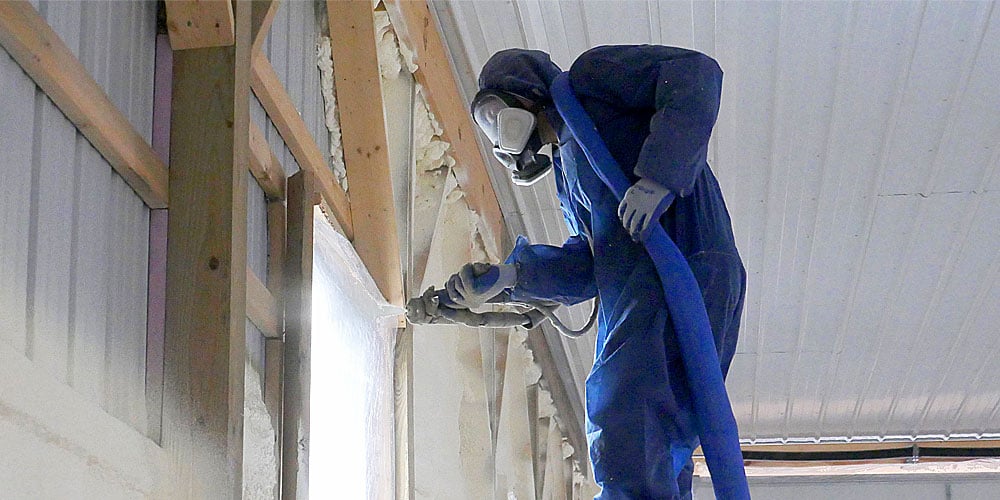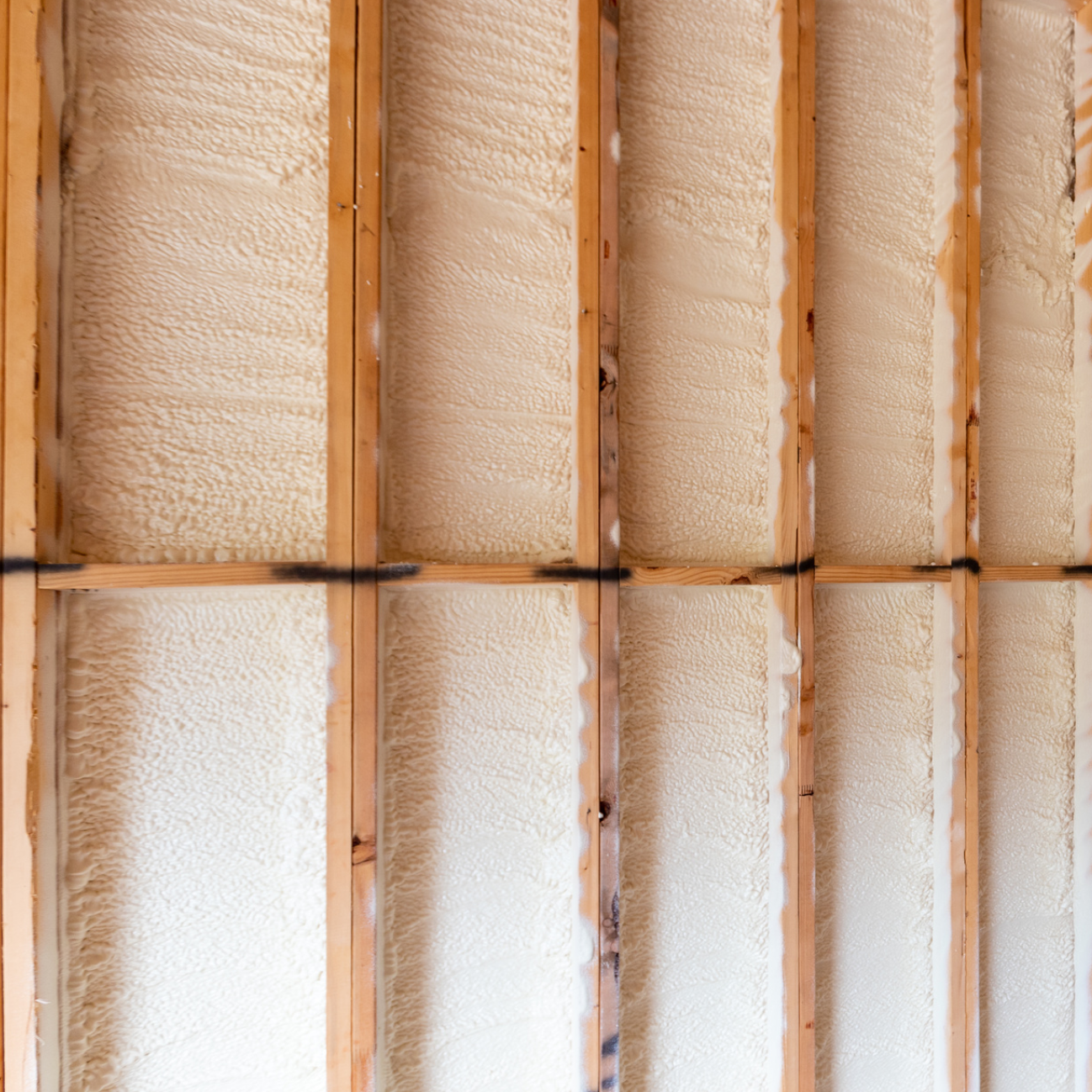Contrasting Spray Foam to Typical Insulation: Which Is Much better?
Contrasting Spray Foam to Typical Insulation: Which Is Much better?
Blog Article
Exactly How Spray Foam Can Enhance Power Efficiency in Any Building
Spray foam insulation has actually emerged as a critical remedy for boosting power efficiency across different structure kinds. As residential or commercial property proprietors significantly look for sustainable solutions, the implications of spray foam insulation prolong past plain energy financial savings.
Recognizing Spray Foam Insulation
Spray foam insulation is significantly recognized for its exceptional thermal performance and adaptability in different applications. Composed mainly of polyurethane, this insulation material is applied as a fluid that increases upon get in touch with, filling gaps and creating a seamless barrier. This distinct residential property enables spray foam to comply with irregular surfaces, making it a suitable option for both commercial and domestic structures.

Application of spray foam insulation is usually executed by trained experts making use of specialized equipment, making sure ideal efficiency and safety and security - Spray Foam. The treating process is fast, enabling fast installation and very little interruption. Because of this, spray foam insulation is progressively being utilized in brand-new construction and retrofitting projects due to its ability to enhance structural stability while enhancing general energy efficiency in structures
Advantages of Power Effectiveness
Energy effectiveness plays a critical role in minimizing operational expenses and lessening environmental influence across different fields. By enhancing energy usage, property owners and companies can achieve considerable savings on utility costs, which directly boosts monetary efficiency. Efficient energy intake implies much less reliance on fossil fuels, therefore contributing to a reduction in greenhouse gas emissions and promoting a more lasting atmosphere.
Moreover, energy-efficient buildings usually experience boosted building values. As energy expenses increase and sustainability ends up being a top priority for consumers, buildings with enhanced energy efficiency functions are a lot more attractive on the marketplace. This pattern motivates investment in energy-saving innovations, which can even more drive advancement and financial development.
Along with financial and environmental advantages, power performance can additionally boost the total comfort and health and wellness of interior areas. Appropriate insulation and effective cooling and heating systems assist preserve constant temperatures, decreasing drafts and moisture degrees, which consequently can result in better indoor air high quality.
Inevitably, the advantages of energy efficiency expand beyond immediate financial savings, cultivating a durable economic climate, promoting environmental stewardship, and boosting the top quality of life for passengers in any type of building.
Just How Spray Foam Functions
Usually applied as a fluid, spray foam increases swiftly upon call with surface areas, forming a strong barrier that effectively secures spaces and cracks. This special building is because of its chemical composition, largely including isocyanates and polyols, which react when blended to create a foam that adheres and fills spaces to various materials, consisting of concrete, wood, and steel.
As soon as applied, the foam increases to a number of times its initial volume, making sure a tight seal that prevents air leak. This procedure substantially lowers thermal connecting, which takes place when warm transfers via materials, causing power loss. The foam's high R-value, a measure of thermal resistance, adds to improved insulation by lessening warmth transfer between the interior and exterior environments.
Furthermore, spray foam is immune to dampness and pests, even more boosting its effectiveness in keeping power efficiency. Its application can be tailored to different locations, including attics, walls, and crawl areas, enhancing insulation across a structure. Spray Foam. Generally, the cutting-edge layout and application approach of spray foam make it an efficient option for boosting power performance in any kind of framework, leading to decreased energy costs and a more sustainable developed setting

Applications in Different Buildings
Numerous applications of spray foam insulation can be located across different structure types, boosting energy performance and comfort. In household homes, spray foam is frequently made use of in attics and wall surfaces to develop a smooth barrier versus air leakages, considerably reducing heating this content and cooling down needs. This application is especially valuable in older homes, where conventional insulation might be poor.
In commercial structures, spray foam insulation is related to roofing systems and outside wall surfaces, which helps to enhance thermal performance and secure versus moisture intrusion. Its lightweight nature makes it an optimal selection for retrofitting existing frameworks without adding substantial weight. Furthermore, spray foam can be utilized in industrial setups to protect pipelines and tank, keeping temperature level control for delicate products.
Institutional structures, such as healthcare facilities and institutions, gain from spray foam insulation by ensuring a consistent interior environment that sustains passenger convenience and wellness. The adaptability of spray foam permits it to adjust to different building forms and dimensions, making it a recommended option for designers and home builders seeking effective insulation solutions. Overall, spray foam insulation works as a crucial part in accomplishing energy-efficient buildings across all fields.
Long-Term Price Cost Savings
Spray foam insulation provides substantial lasting expense savings for structure owners and occupants by lowering energy consumption and decreasing utility costs. By supplying an exceptional air seal, spray foam decreases the seepage of outside air, therefore improving the thermal efficiency of a building. This results in more effective home heating and cooling down procedures, which can result in substantial decreases in power expenses over time.
Along with immediate financial savings on utility costs, the toughness and longevity of spray foam insulation add to its economic advantages. Unlike typical insulation materials, which might droop, work out, or wear away, spray foam keeps its efficiency for decades, lowering the need for regular substitutes or fixings. This durability converts to lower maintenance prices and less interruption for owners.
Furthermore, buildings outfitted with spray foam insulation often enjoy a rise in residential property worth, making them more appealing to possible customers or tenants. As energy efficiency ends up being progressively prioritized, residential or commercial properties with efficient insulation options attract attention in the market. Ultimately, the integration of spray foam insulation not only boosts convenience yet additionally stands for a critical financial investment that generates significant financial benefits over the lengthy term.
Verdict
In conclusion, spray foam insulation works as a vital part in boosting power effectiveness across diverse structure kinds. Its capability to create a smooth barrier against air leak, incorporated with moisture-resistant properties and high r-values, significantly additional hints minimizes energy consumption and linked expenses. The implementation of spray foam not just adds to constant interior temperature levels but additionally boosts residential property value, emphasizing its function as a sensible financial investment for both business and property homes.
Spray foam insulation has arised as a pivotal option for boosting energy performance across numerous building kinds. Spray Foam. As an outcome, spray foam insulation is progressively being used in new building and construction and retrofitting projects due to its capability to boost structural stability while improving general power efficiency in buildings
Generally, the innovative style and application approach of spray foam make it an effective service for enhancing power effectiveness in any this hyperlink kind of framework, leading to decreased energy prices and a much more lasting constructed environment.
Various applications of spray foam insulation can be discovered throughout numerous building types, improving energy effectiveness and convenience.In verdict, spray foam insulation serves as an important element in improving power performance across varied building kinds.
Report this page